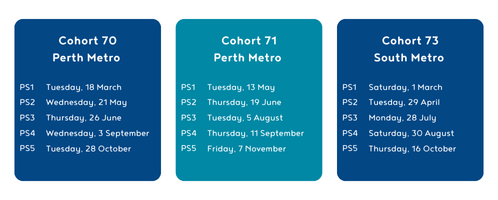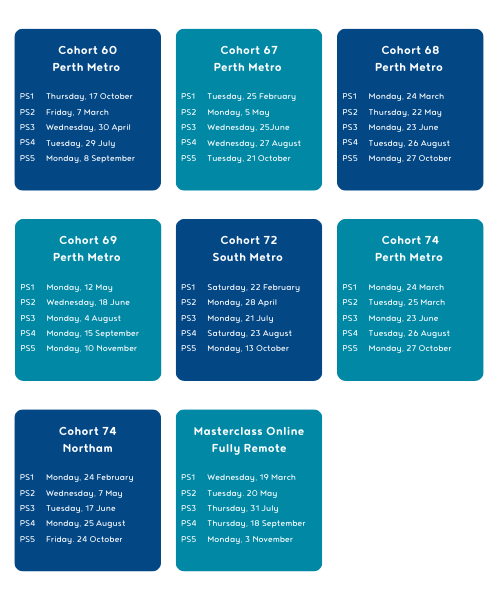Welcome back to Term 4!
We hope you had a restful break and are ready for an exciting final term filled with learning and celebration of the year’s achievements. Talking of achievements, as our 2025 Masterclasses start to wrap up, we are seeing some fantastic results and feedback from the participants and students this year. We can’t wait to share them with you in our 2025 Impact Report.
We have some incredible new courses in WA commencing in Term 1, 2026 and of course, we are offering the Masterclass Series in person and online again. Please see below for more details.
Teach Well Online Modules – new in 2026!
Teach Well is launching a new series of professional learning programs designed to support schools and teachers in curriculum design, resource implementation, and effective classroom instruction. Click here to find out more.
Teaching for Impact in Mathematics
The Teaching for Impact in Mathematics (TIM) Series provides professional learning support and resources to teachers and leaders to get the most from the Ochre Education materials. Working from a robust research and evidence base, the TIM Series supports teachers and leaders to build more high-impact instruction into their classrooms and schools, to accelerate learning for all students. Learn more here.
Instructional Lead Fellowship
The Instructional Lead Fellowship is a 3-day program for Teach Well alumni and school leaders to build their capacity to embed and sustain high-impact instruction in their school. The sessions will enhance skills in designing impactful professional learning for staff, building an effective coaching framework and strengthening guaranteed and viable curriculum to enhance student learning. In 2026 we are offering the program online and also in-person in WA. Find out when the Fellowship is running here.
Masterclass Series in High-Impact Instruction
A 9-month course supporting teachers and school leaders to build more high-impact instruction into their classrooms. Please see dates for all WA cohorts available in 2026. Find out more here.
Getting to know Curriculum Development in Practice
This spotlight session offers a glimpse into the strategies explored in the Curriculum Development in Practice program. Hosted by Janine and Sasha, the creators of this highly successful project that has already made a significant impact on the East Coast, the spotlight session offers practical insights that will guide you in building a guaranteed and viable curriculum aligned with high-impact instructional practices.
Tuesday, 20 November 2025 – 3.30pm – 4.30pm AWST
Online – register now.
📚 Teach Well – Alumni Resources 🤓
Have you ordered your copy yet?
Teach Well’s Instruction and Coaching Companion is now available!
Designed with your teams in mind, the Companion offers practical, bite-sized guidance to support high-impact teaching. It’s the perfect tool for coaching sessions, PLCs, and refining your craft using the strategies from the Masterclass Series.
If you haven’t grabbed your copies yet, now’s the time. Click here to order.
Have you ever wanted a glossy poster for your classroom wall?
You asked, and we’ve finally got it happening. Our Teach Well posters are now available, at cost, in hardcopy printed format for any teachers or leaders wanting a more durable copy for the classroom or staff room wall. Order HERE and send us a picture of your poster on the wall!
Teach Well’s Essential Induction Resources for Great Teaching
Following on from the success of our Instruction and Coaching Companion, the Teach Well team have created another fantastic resource for your school.
Teach Well’s Essential Induction Resources has been developed to support schools in building and strengthening their own induction handbooks for teachers. It brings together a curated collection of posters and guides that capture the key principles and practical implementation ideas behind the high-impact instructional strategies explored in greater depth through our courses. Designed to be flexible and adaptable, this collection allows schools to select and integrate the resources most relevant to their context—whether for induction materials, professional learning documentation, or team-based planning. Download your copy now.



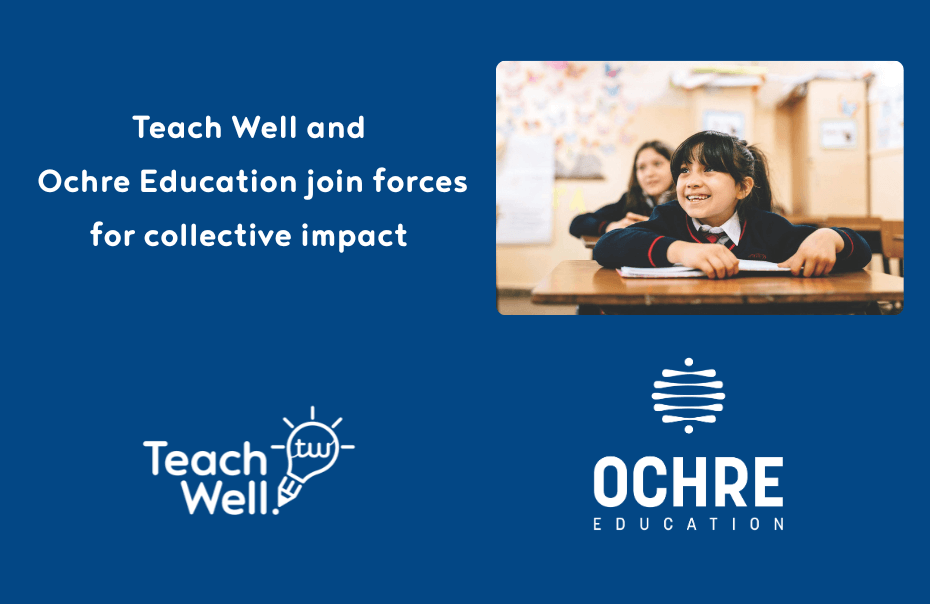
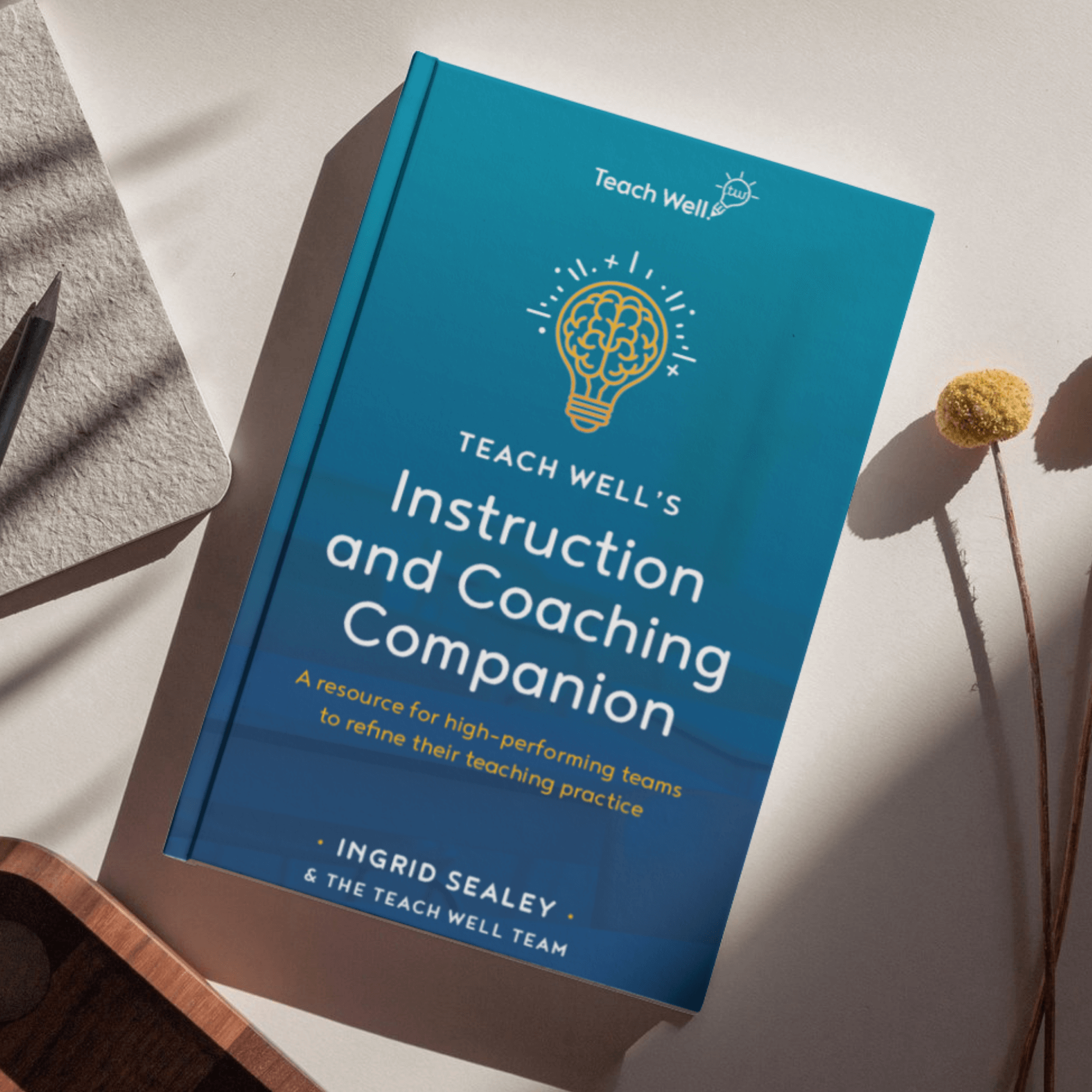







 The Karnup Network of 12 primary schools and 3 secondary schools serves more than 10,000 students, approximately one hour south of Perth. In a rapidly developing and growing area, most schools are less than 10 years old and have seen large year-on-year growth in student numbers. After 3 years of sustained effort and commitment, spanning 6 dedicated cohorts of the Masterclass Series for both K-2 and Year 3-10 teachers and leaders, the schools are seeing visible improvements in student learning, as reflected in NAPLAN. The network has also built their leadership capability through Teach Well’s Instructional Lead Fellowship program and Instructional Coaching Impact Cycle partner program. Through a combined focus on empowering teachers and leaders at all levels, Karnup has achieved some of the most impressive progress for any network in WA.
The Karnup Network of 12 primary schools and 3 secondary schools serves more than 10,000 students, approximately one hour south of Perth. In a rapidly developing and growing area, most schools are less than 10 years old and have seen large year-on-year growth in student numbers. After 3 years of sustained effort and commitment, spanning 6 dedicated cohorts of the Masterclass Series for both K-2 and Year 3-10 teachers and leaders, the schools are seeing visible improvements in student learning, as reflected in NAPLAN. The network has also built their leadership capability through Teach Well’s Instructional Lead Fellowship program and Instructional Coaching Impact Cycle partner program. Through a combined focus on empowering teachers and leaders at all levels, Karnup has achieved some of the most impressive progress for any network in WA. In 2021, at the start of the network’s improvement agenda, 26% of NAPLAN areas for primary schools were well below expected performance. In 2024, only 7% are well below, with 93% of NAPLAN areas now within expected performance – a four-fold increase in the percentage of NAPLAN areas well above expected performance between 2021 and 2024 (Figure 1). For all network schools, 94% of NAPLAN areas are now within expected performance, or well above expected performance, an increase of 27 percentage points from 2023 (Figure 2). Year 3 and Year 5 students have shown impressive improvement across all NAPLAN areas between 2021 and 2024 (Figures 3-4).
In 2021, at the start of the network’s improvement agenda, 26% of NAPLAN areas for primary schools were well below expected performance. In 2024, only 7% are well below, with 93% of NAPLAN areas now within expected performance – a four-fold increase in the percentage of NAPLAN areas well above expected performance between 2021 and 2024 (Figure 1). For all network schools, 94% of NAPLAN areas are now within expected performance, or well above expected performance, an increase of 27 percentage points from 2023 (Figure 2). Year 3 and Year 5 students have shown impressive improvement across all NAPLAN areas between 2021 and 2024 (Figures 3-4).



 Since 2021, Teach Well has partnered with WA’s Midwest Region as part of their Targeted Teaching strategy to improve student academic outcomes. The Midwest education region has 46 public schools, serving over 7,700 students. With some of the state’s most disadvantaged children and around 30% Indigenous students, the region had historically seen stagnated student results. Through the Targeted Teaching strategy, enabled through a relentless focus on high-impact instruction using Teach Well’s Masterclass Series and the Instructional Lead Fellowship, schools have achieved outstanding year-on-year growth in student results. The Teach Well experience has been highly effective in uniting networks of schools across the Midwest by providing a common language for high-impact instruction. School leaders across the region have worked to build educators’ skills to drive sustainable change at all levels in the Midwest through a focus on:
Since 2021, Teach Well has partnered with WA’s Midwest Region as part of their Targeted Teaching strategy to improve student academic outcomes. The Midwest education region has 46 public schools, serving over 7,700 students. With some of the state’s most disadvantaged children and around 30% Indigenous students, the region had historically seen stagnated student results. Through the Targeted Teaching strategy, enabled through a relentless focus on high-impact instruction using Teach Well’s Masterclass Series and the Instructional Lead Fellowship, schools have achieved outstanding year-on-year growth in student results. The Teach Well experience has been highly effective in uniting networks of schools across the Midwest by providing a common language for high-impact instruction. School leaders across the region have worked to build educators’ skills to drive sustainable change at all levels in the Midwest through a focus on:
 Alumni of Teach Well’s programs often attend refresher workshops with their teams to deepen their knowledge. This empowers them to lead more work back at school. This kind of peer support helps to reinforce best practices across schools. A focus on supporting coaches through professional learning and mentoring has enabled schools to develop strong coaching conversations. The results of this partnership are inspiring. The Midwest schools have shown strong improvement from 2021 to 2024, with 89% of all NAPLAN areas now within expected performance, or well above expected performance (Figure 1).
Alumni of Teach Well’s programs often attend refresher workshops with their teams to deepen their knowledge. This empowers them to lead more work back at school. This kind of peer support helps to reinforce best practices across schools. A focus on supporting coaches through professional learning and mentoring has enabled schools to develop strong coaching conversations. The results of this partnership are inspiring. The Midwest schools have shown strong improvement from 2021 to 2024, with 89% of all NAPLAN areas now within expected performance, or well above expected performance (Figure 1).


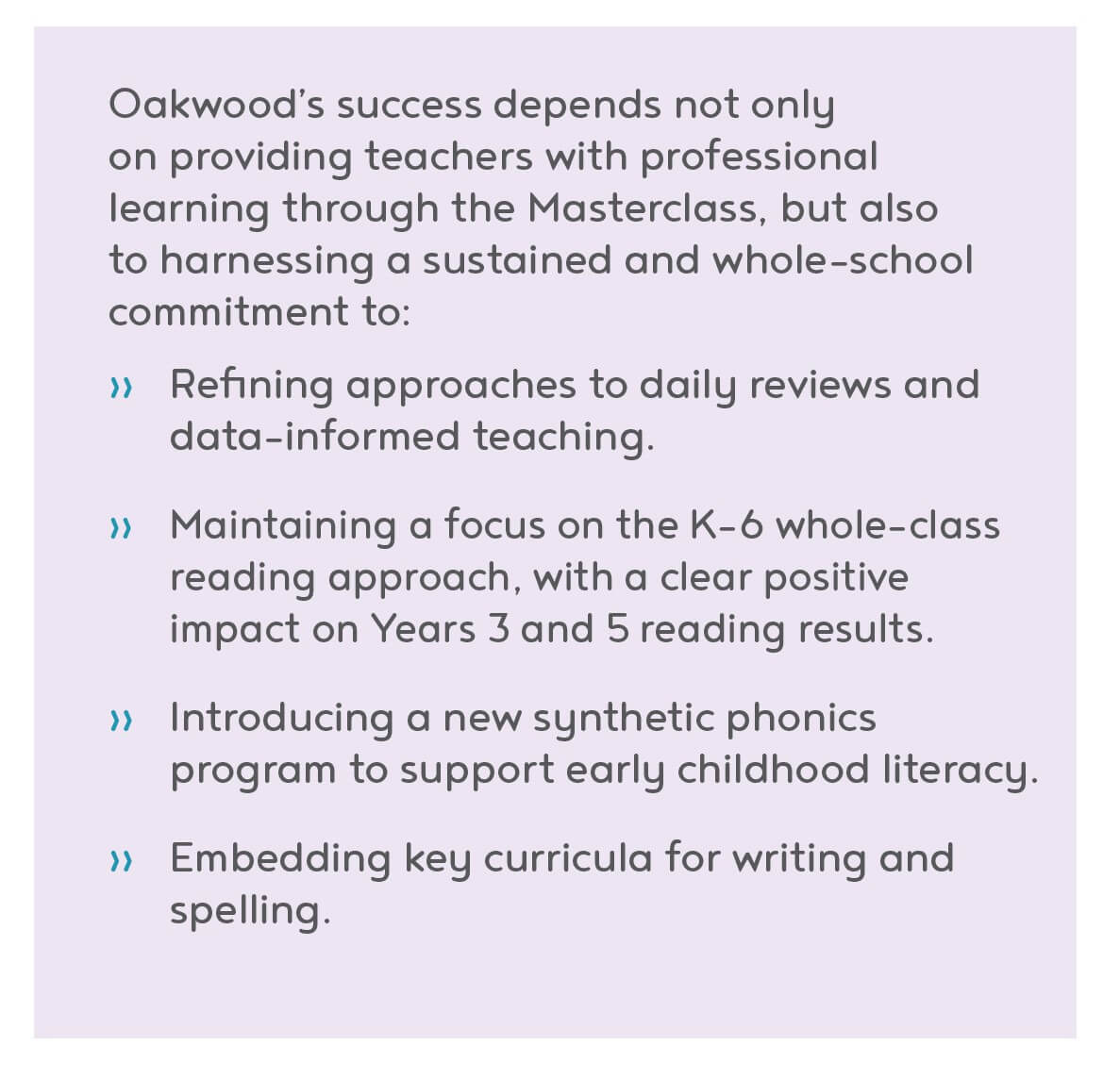 Oakwood Primary School is a government school located one hour south of Perth. With an ICSEA value of 1005, the school serves over 900 students. As part of its school improvement journey, the school committed to the Masterclass Series in 2022 to upskill its teachers in high-impact instruction. Since then, 29 staff have participated in the Masterclass Series. In 2021, at the start of Oakwood’s improvement journey, for Years 3 and 5, the percentage of NAPLAN areas within expected performance was 60%, with 40% of areas well below expected performance. In 2024, 100% of NAPLAN areas are now within or well above expected performance. Oakwood’s target of being at or exceeding the performance of ‘Like Schools’ (i.e. with students from similar backgrounds based on parental occupation and education) was resoundingly achieved in 2024. Students significantly outperformed their peers from Like Schools in the key areas of Reading, Writing, and Numeracy across both Years 3 and 5 (Figures 1-3), bucking the trend of stagnating performance in peer schools.
Oakwood Primary School is a government school located one hour south of Perth. With an ICSEA value of 1005, the school serves over 900 students. As part of its school improvement journey, the school committed to the Masterclass Series in 2022 to upskill its teachers in high-impact instruction. Since then, 29 staff have participated in the Masterclass Series. In 2021, at the start of Oakwood’s improvement journey, for Years 3 and 5, the percentage of NAPLAN areas within expected performance was 60%, with 40% of areas well below expected performance. In 2024, 100% of NAPLAN areas are now within or well above expected performance. Oakwood’s target of being at or exceeding the performance of ‘Like Schools’ (i.e. with students from similar backgrounds based on parental occupation and education) was resoundingly achieved in 2024. Students significantly outperformed their peers from Like Schools in the key areas of Reading, Writing, and Numeracy across both Years 3 and 5 (Figures 1-3), bucking the trend of stagnating performance in peer schools.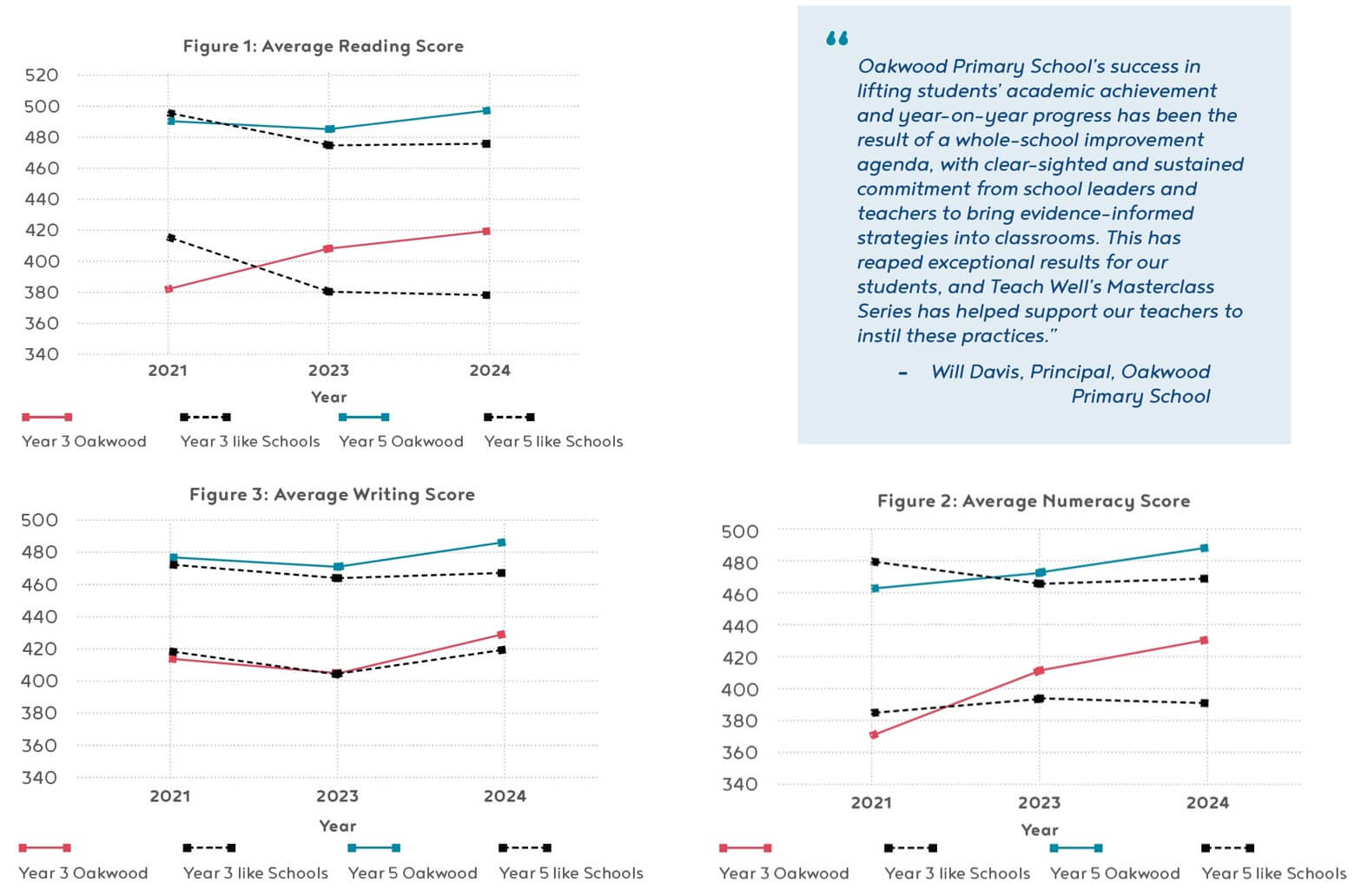
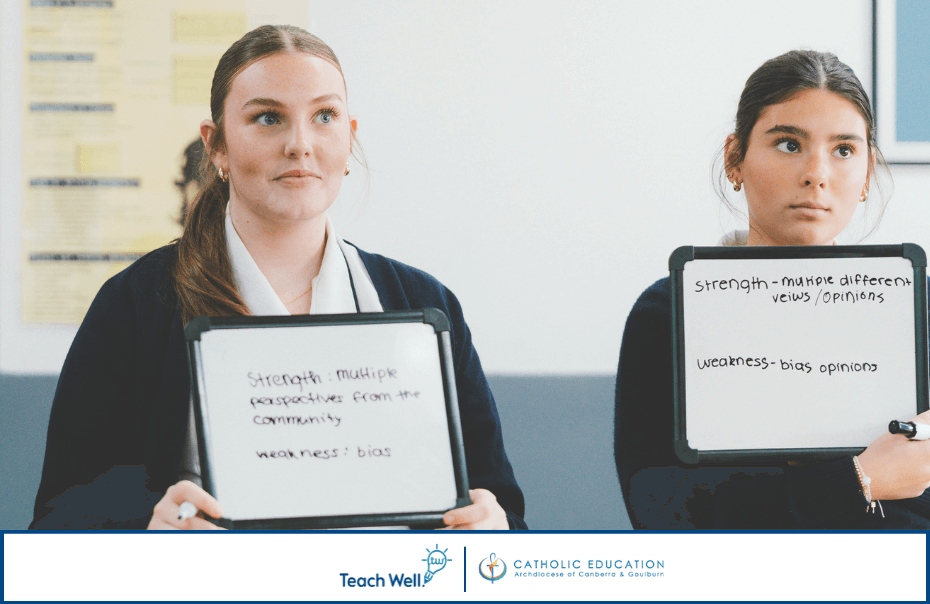
 Five years ago, the Director of Catholic Education for the Archdiocese of Canberra and Goulburn, Ross Fox, decided to retrain his teaching workforce of 1500 staff in the Science of Learning. This educational reform emphasised the importance of all teachers being able to confidently deliver evidence-based high-impact teaching practices, with a shared focus on how students learn and understand new ideas. As part of the Catalyst project, Teach Well’s flagship Masterclass Series has been delivered under the name High Impact Teaching Practices (HITP) in Action – Secondary & Central Series.
Five years ago, the Director of Catholic Education for the Archdiocese of Canberra and Goulburn, Ross Fox, decided to retrain his teaching workforce of 1500 staff in the Science of Learning. This educational reform emphasised the importance of all teachers being able to confidently deliver evidence-based high-impact teaching practices, with a shared focus on how students learn and understand new ideas. As part of the Catalyst project, Teach Well’s flagship Masterclass Series has been delivered under the name High Impact Teaching Practices (HITP) in Action – Secondary & Central Series.



